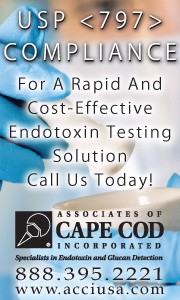|
|
| Letter from the Editor |
| News |
| IJPC now on Facebook |
| Did You Know? |
| Tip of the Week |
| Looking Back |
| PCAB Accreditations |
|
| |
|
|
To place a classified advertisement please contact: Lauren Bernick lbernick@ijpc.com or 405-513-4236 |
| |
|
|
|
|
| |
|
|
|
|
| |
|
|
|
|
| |
 |
| |
 |
| |
|
|
 |
| |
 Letter from the Editor Letter from the Editor |
|
Editorial: United States Pharmacopeia Chapter <51> Antimicrobial Effectiveness Testing
Questions have been raised about the applicability of United States Pharmacopeia (USP) Chapter <51> to compounding pharmacy. Let's look at this chapter and its application.
- USP <51> is a good chapter and serves a great purpose in confirming that any contained antimicrobial preservatives are appropriate and protect the product from microbiological growth or from microorganisms that are introduced inadvertently during or subsequent to the manufacturing process.
- It should be noted that compounding is not mentioned anywhere in the chapter. However, the words "manufacturing process" and "manufacturer" are mentioned.
- Manufactured products have long expiration dates, commonly 2 to 3 years which are somewhat different circumstances than a beyond-use date of from a few days up to 6 months.
- The tests and criteria for effectiveness apply to the product in its original, unopened container in which it was distributed by the manufacturer.
- In this chapter, products are divided into four categories based on either dosage form or content. The chapter describes the test organisms (Candida albicans, Aspergillus niger, Escherichia coli, Pseudomonas aeruginosa, and Staphylococcus aureus) and detailed instructions for the test; this test is beyond the capability of routine compounding pharmacists.
- The test is conducted either in five original containers�or in five sterile, capped bacteriological containers of suitable size into which a sufficient volume of product has been transferred. (Note: This requirement is similar to the multiple container requirement in USP <71> Sterility Testing that is not workable when small quantities are compounded.)
- The test microorganisms are inoculated into the containers and counts taken initially and after incubation. At the end of the incubation times, using the calculated concentrations of cfu (colony forming units) per mL present at the start of the test, the change in log10 values are calculated for the concentration of cfu per mL for each microorganism at the applicable test intervals, and the changes are expressed in terms of log reductions.
- The requirements for passing this test are met if the criteria specified in Table 3 are met. "No increase" is defined as not more than 0.5 log10 unit higher than the previous value measured. (Note: The purpose of the preservative is not necessarily to destroy the microorganisms present but to control their growth in the preserved preparation.)
There is no question that chapter <51> is a great standard for quality for preserved formulations. If a pharmacy is involved in preparing large quantities of a specific, identical compounded preparation meeting the description of those in this chapter, it may need to be a part of their quality system. However, if that is not the case, then this chapter does not "fit" compounding. There must be modifications for this chapter to be applied to pharmacy compounding unless large batches of the same exact preserved formula are compounded.
Loyd V. Allen, Jr., PhD, RPh
Editor-in-Chief
International Journal of Pharmaceutical Compounding
Remington: The Science and Practice of Pharmacy Twenty-second edition
|
| |
| News |
|
Imports from Ranbaxy Blocked by FDA
The U.S. FDA is blocking imports of pharmaceuticals manufactured at the newest plant of India's Ranbaxy Laboratories Ltd., raising questions about the quality of its pharmaceuticals; it is the U.S.'s largest supplier of generic drugs. The FDA said it found "significant" violations of manufacturing rules, "including failure to adequately investigate manufacturing problems" during two plant inspections. The FDA announced that Ranbaxy won't be allowed to manufacture drugs for the U.S. at the Mohali site until the company comes into compliance with FDA standards. Currently, at least three of Ranbaxy's eight plants in India are unable to export to the U.S.
http://online.wsj.com/article/SB10001424127887324665604579078293473918108.html?cb=logged0.3343332873644734
http://www.thehindu.com/sci-tech/health/presence-of-human-hair-oil-in-tablets-behind-ranbaxy-ban/article5142067.ece
Big Pharma Scandals Widen
A corruption crackdown in China's pharmaceutical industry has hurt sales at international and local firms. Many doctors at Chinese hospitals are refusing to see drug representatives for fear of being caught up in the widening scandal.
http://www.reuters.com/article/2013/09/18/us-china-pharma-sales-analysis-idUSBRE98H07620130918
|
| |
| IJPC Now on Facebook |
|
Become a fan of the IJPC Facebook page and share ideas, photos, and keep up to date with the latest compounding information - http://www.facebook.com/IJPCompounding
|
| |
| Did You Know ... |
|
...that autumn (fall) is one of the four temperate seasons and marks the transition from summer into winter in September in the Northern Hemisphere. Before the 16th century, harvest was the term usually used to refer to the season. However, as more people gradually moved from working the land to living in towns, the word harvest lost its reference to the time of year and came to refer only to the actual activity of reaping, and autumn, as well as fall, began to replace it as a reference to the season. Autumn is associated with the start of a new school year, American football, post-season baseball, and cooler weather.
|
| |
| Tip of the Week |
|
Autumn in poetry has often been associated with melancholy. This can be addressed in your pharmacy using the bright colors of fall!
|
| |
| Looking Back |
|
If man bites doggie,
That is news!
If face scares doggie,
Better use
Burma Shave
|
| |
| Accreditations |
|
PCAB is proud to announce the accreditation of the following pharmacy:
King's Compounding Pharmacy, Amarillo, Texas; Robin Johnson, RPh, robin@amaonline.com. Re-accreditation for Sterile & Nonsterile Compounding
|
|




